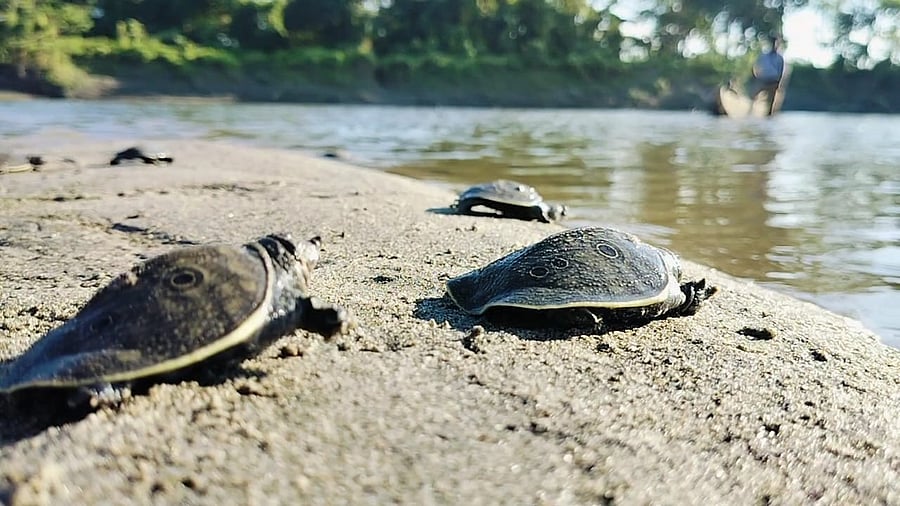
Black soft shell turtles.
Photo credit: Turtle Survival Alliance Foundation of India
Guwahati: The once deplorable eutrophic conditions in the ponds of Assam's ancient temple premises, where black soft shell turtles are worshipped, made conservationists worried.
But conservation efforts in the past few years have turned two such ponds -- one at the Hayagriv Madhab temple in Hajo near Guwahati and Nag Shankar temple in North Assam's Biswanath district -- into conservation hubs for the critically endangered turtle species and its future.
While the temple authorities were successfully taken on board to adopt safe practices for survival of the species, eggs collected from the two ponds have helped conservationists rear over 600 black softshell turtles since 2013 in the Brahmapura and other rivers in Assam, one of the major natural habitats. This has become a reality under joint efforts by the Turtle Survival Alliance Foundation of India (TSAFI), an NGO and the Assam forest department.
Captive bred black soft shell turtles.
Photo credit: Turtle Survival Alliance Foundation of India
"After years of awareness and grassroot activities, now these temples have become models for turtle conservation. Proper diet is provided and unfit items such as biscuits, puffed rice are banned, as turtles are mostly carnivorous. Artificial sand/nesting banks have been developed for them to bask and nest. The beautification/concrete structure does not limit the movement of turtles and prevents overcrowding in basking spots. Assisting with the care of their turtles, egg collection, incubation, hatching of eggs and head-starting, the program is poised towards the goal of utilizing the temple pond turtle populations for a wild recovery effort," Susmita Kar, the project co-ordinator of the TSAFI, told DH.
"These eggs are incubated by experts in the Hajo temple premises as well as in the Assam State Zoo campus. So far, more than 600 captive-bred turtles have been released and our target is to cross the 2000 mark by 2030 to protect its future," Kar said.
The black soft shell turtles, which are often termed "vultures of the water" for its critical scavenging role in maintaining aquatic ecosystems, were in abundance in rivers in Assam and parts of neighbouring Bangladesh. But constant hunting for meat pushed the species to the brink of extinction. "The temple ponds of Assam and few other states in India conserve turtles from historical times, where turtles are revered and donated as offerings to the God. This provided hope to our conservation efforts. The Nagshankar temple pond holds 11 species of threatened freshwater turtles, the majority of which are threatened."
Kar said the temple committees as well as the priests have become important stakeholders as they now adopt certain practices such as proper feed for turtles, maintaining turtle-friendly infrastructures, health checkups, and issue guidelines for the visitors. "They are the ones who can pose as a role model, involving and sensitizing local community members and encouraging other temples to follow the suit. This is how religious sentiments and wildlife conservation can be merged flawlessly."
On Friday, several such incubated turles were released in the Brahmaputra river under Biswanath Wildlife Division, which falls under the famous Kaziranga National Park and Tiger Reserve. Steps have also been taken to prevent further hunting, Kar said.